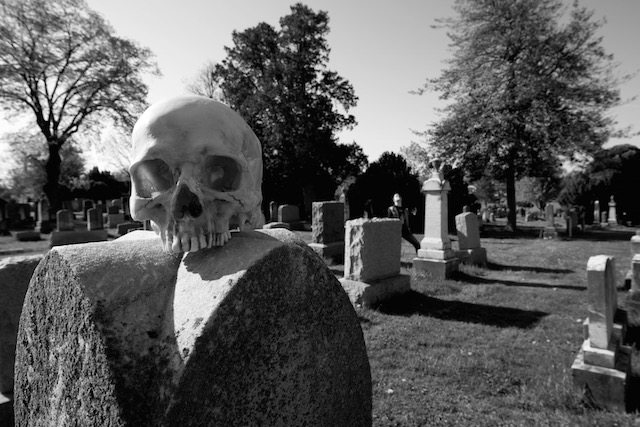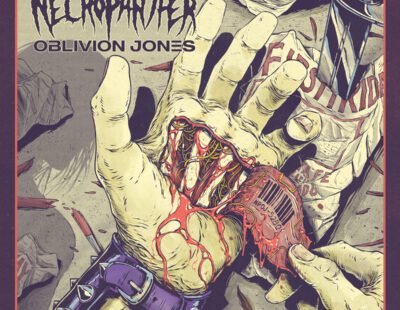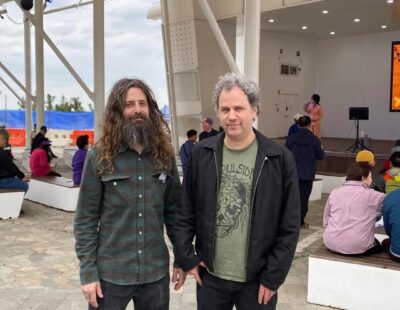
Whether we’re talking his innovative, grotesque artwork for seminal bands like Morbid Angel, Suffocation, Autopsy, and Dying Fetus or the uber-brutal death metal he’s summoned from the grave for decades via outfits such as Excrescent, Unburied, The Soil Bleeds Black, Grave Wax, and Macabra, it’s difficult to imagine a more legit motherfucker in the extreme music underground than Mark Riddick.
And anyone who doubts this is going to have their hands full in a couple months attempting to wrestle with Epicedia, the gnarly, epic, forward-thinking-yet-utterly-feral masterpiece from Riddick’s solo project Fetid Zombie.
We’ve got an exclusive stream of the album below as well as an interview with Riddick about metal, art, horror, gore, and true transgression.
Both your work as an artist and Fetid Zombie channels such a vast array of horror-death metal culture influences. I’m curious about when you first felt a connection to these worlds.
I’ve been a fan of metal music since 1986 and became active in the underground death metal scene in 1991, I’ve been involved in this music for two and half decades so there is certainly an inevitable connection with my artwork and song-writing approach. My first interest in metal music came in 1982, when I witnessed Iron Maiden’s Killers album cover on a record store shelf. The cover artwork struck a chord with me and ever since then I knew I wanted to draw album covers; it wasn’t until I discovered the underground scene that I found an outlet for my creative endeavors.
Did you ever feel a tension between dedicating yourself to art and music?
There has always been a sense of synergy; I certainly dedicate much more of my time toward my art rather than my music because I’ve found much more success and bliss there. I’ve been publishing music for just as long as I’ve been actively illustrating for bands and have published well over 50 releases with various projects across many genres throughout my musical career, however Fetid Zombie is a mainstay for me as it is a solo effort that allows me as much creative freedom as I wish.
How does all of that fit into the origin story of Fetid Zombie?
Fetid Zombie was born in 2007 in an attempt to get back to my roots writing and recording death metal music. Prior to that I had participated in other bands and in other genres of music but wanted to do something that I had complete creative control and freedom over in terms of audio and visuals.
As I suggested earlier, it seems to me you’ve always worked to synthesize a lot of different extreme music strains in Fetid Zombie — and done it well! — but on Epicedia it feels as if you’ve really hit your stride. Did you feel things gelling as you composed these songs?
Fetid Zombie is a constantly evolving project. My approach has changed quite a bit since my early releases and I do believe I’ve found my stride in terms of writing full-length albums. The core of Fetid Zombie will always be old school death metal. This is not to be trendy but because this is my songwriting style; it’s unavoidable because this is the kind of music I essentially grew up listening to. With this in mind, I also try to offer something unique and interesting with Fetid Zombie by bending and mixing genres a bit.
Do you in part attribute that success to how active the band seems to have been of late with regards to splits and Grotesque Creation?
On recent recordings, I’ve borrowed much influence from hard rock and traditional heavy metal music, which is where I got my start listening to metal. Epicedia was uniquely challenging as it was my first time writing and recording songs that each span 8-10 minutes in length. Keeping the songs engaging and composing them in such a way that made sense was a new test for me but it seemed to work out well in the end and I hope to attempt this again sometime in the future.
Does your work as an artist inform what you do as a musician at all? I ask because, first of all, the lyrics obviously paint very vivid pictures and, second, there are a lot of interesting tones and atmospherics that feel as if they might come from a palette larger than guitar/vocals/drums.
The artwork for Fetid Zombie feeds more so from the music rather than vice versa. Fetid Zombie has taken on a much more serious tone in recent years; this is likely a natural maturation, especially now that I’ve crossed the threshold into my forties, my worldview and perspective on the human condition has changed and this has informed the content of my music.
Speaking of…can you talk to me about the lyrical content here? I love that “Devour the Virtuous” leads into a track called “Devour the Innocent.” Lot of devouring going down!
The term “Epicedia” refers to a collection of epitaphs which is essentially what the album is in terms of lyrical content. The album title is also a play on words in that the songs on the album are epic in nature by virtue of their labyrinth-like lengthy compositions. Each track somehow deals with mortality, the opening track, “Lowered Beneath,” is concerned with the realization and process of dying, track two, “Devour the Virtuous,” covers the theme of death by religious persecution, track three, “Devour the Innocent,” deals with the death of a child, and the final track, “If the Dead Could Speak,” covers the theme of grief and copping. The second and third tracks are essentially compendium songs in that their structure and some of the riffs are very similar or linked in some ways. Overall, the album has a very morose premise, even down to the layout wherein I’ve utilized one typeface and typesetting style akin to what would appear on an engraved tombstone.
We’ve got to talk guest contributors.
Epicedia would not have been possible without the help of my guest musicians, all of whom are incredibly talented. Sometimes composing music is more about having a vision. Because I know that I often cannot see my vision through within the bounds of my own abilities, I often depend on guest musicians to fill the void. I’m very grateful to be connected to such amazingly talented individuals and am very happy they were willing to work with me to see the album through. I solicited the help of a very unlikely bunch of individuals for this recording, many of whom have gone under the radar but have so much to offer to the metal scene.
I worked very closely with Josh Fleischer, from a local band called Svierg — with whom I will be releasing a split CD with this year — to co-write some of the material for Epicedia, Josh’s contributions were crucial in terms of building the songs up. The guitar solo work on Epicedia is a key component to the album. I wanted something that reeked of 1980s guitar shredding so I called upon Toby Knapp, who I’ve worked with on several occasions in the past, and he laid down some incredibly awesome guitar solos throughout the album. In addition to Toby, I brought in Jamie Whyte to deliver some extremely melodic solo work on a few of the tracks after hearing his band’s debut album, Johnny Touch, “Inner City Wolves” — a very killer release for any fan of traditional heavy metal with great vocals and killer leads. Although bass guitar is my main instrument, I invited Nick Walker, from Bane of Bedlam, to contribute a bass solo, adding another element of interest to the album. In terms of vocals, I worked with Yusef Wallace, from the band Rude, Ralf Hauber, from Revel in Flesh, and Nunsslutgoat, from Goat Holocaust, to compliment my own vocal efforts and bring another dynamic to the release. Lastly, I solicited Dawn Desiree, from a now defunct local doom band, Rain Fell Within, to sing in her stunning operatic voice on some parts throughout the album. Although coordinating with so many different musicians takes much time, the end result was exactly what I had hoped for.
The only disappointment in terms of guest musicians was my inability to acquire contributions from Brendan Perry of Dead Can Dance, whom I wanted to lay down some vocal parts on “Devour the Innocent.” I tried reaching out to him and his management but to no avail; perhaps he has retired from music?
We’re debuting “Devour the Virtuous” this morning. Any interesting background on this song?
Yes, I believe “Devour the Virtuous” is a good representation of the album in general. The song was the first one composed for the album and also appeared on a demo tape I released last year as well as on the Sepulchral Voices LP compilation. Epicedia will be released on CD before the end of the year, courtesy of the Indian label, Transcending Obscurity and on cassette by Morbid Visions Music before the end of the year.







